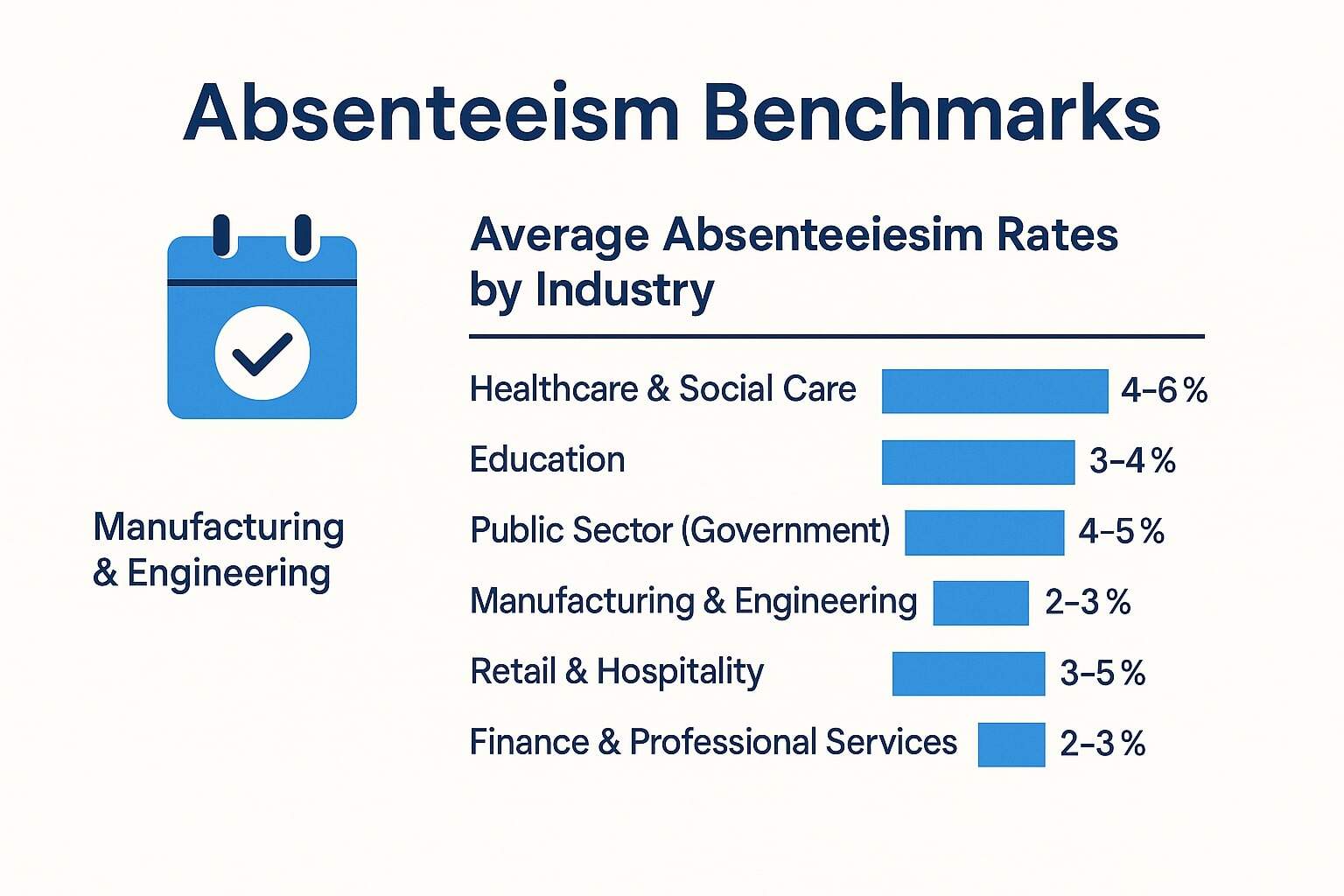Why you need an absence policy

Absence, in its various guises, is inevitable – employees have to take time off. Consistently being caught off-guard by staff absence, however, doesn’t have to be. Creating a structured absence policy gives you a plan of action for dealing with both planned absence (such as holidays or parental leave) and unplanned absence (such as sickness or emergencies). Effective absence policies help organizations meet legal compliance for statutory sick pay and holiday entitlements, and reduce the risk of costly legal disputes. Comprehensive policy sets provide clear guidance for both employees and managers, ensuring that procedures are followed consistently and fairly. Here are a few reasons you need one for your company.
Save time on sickness absence
The first and most significant advantage of an absence policy is that it saves everyone time and effort. It ensures that employees, HR, and management are on the same page.
For a start, just having a policy makes it far more likely that your employees will be familiar with the procedure for different types of absence. They can be taken through the policy during their company onboarding and told where they can find it for their own reference. They’ll be better able to answer queries regarding absence for themselves. An absence policy is a simple plan to explain to members of staff how to report their absence and what they can expect from you as an employer. The policy sets out clear procedures for employees to report or request absences, ensuring everyone knows what is expected.
When there actually is an issue, HR will have an official ruling to refer to – a company line on the matter. They won’t be responsible for resolving the dispute themselves and there’ll be less reason to involve management.
Also, an absence policy saves time by establishing an official point of contact for staff. This is particularly useful for new employees, who are less familiar with the company hierarchy and procedure. However, it’ll also help more seasoned members of staff, who may need time off for less conventional reasons and are unclear about who to speak to about it. Employees are entitled to sick pay provided they comply with the sickness absence reporting procedure set out in the policy.
Helps with strategic decisions on sickness absence
Drafting an absence policy compels you to consider all the reasons employees may take time off from work and how each could affect your company. Managers must decide on acceptable reasons for absence and use clear examples to illustrate policy points, such as differentiating between short-term sick leave, long-term sickness absence, and compassionate leave. You might have procedures for dealing with annual leave or sick days, but what about longer-term sickness absence – or compassionate leave?
Being aware of the potential reasons for absence enables you to make better strategic decisions regarding staff, which serves to make your company more adaptable. The policy should also establish clear guidelines about the return to work process after an absence.
It's preventative
Having an absence policy will actually prevent absences as well as help to solve disputes. Punctual attendance is a key expectation for all employees, and being absent without proper justification can have consequences as outlined in the employee’s contract. Regular attendance is an implied term of every employee’s contract of employment, and employees are expected to take responsibility for achieving and maintaining good attendance.
For instance, if employees are aware of how they’ll have to justify sickness absence, with doctor’s notes or a back to work interview, they’ll be less likely to call in sick without proper justification. On the other hand, if, as per your absence policy, they know that remote working is an option when they’re under the weather, they’ll opt to stay home instead of coming into the office and compromising their colleagues’ health. Monitoring absence patterns is also important, as it allows organizations to identify potential problems, manage infectious outbreaks, and address frequent or prolonged absences effectively.
Better for morale and mental health
Related to the above point of prevention is the fact that a policy is good for employee morale. The fact that the company has an absence policy shows that they acknowledge the fact that people need to take time off makes employees feel more cared for. That they’re a person and not merely an expendable employee.
Providing full pay during certain periods of absence and offering special leave for genuine grounds, such as personal circumstances or disability, further supports employee wellbeing. Arranging cover for absent employees ensures business continuity and helps reduce stress for other staff members.
With this feeling permeating your company, staff are going to be happier in their work overall. They’ll be less friction between management and employees, leading to less stress, burnout – and fewer absences. Better still, employees are more loyal to a company that looks after their wellbeing, resulting in lower staff turnover. Offering generous holidays and recognizing bank holidays as part of leave entitlements can also contribute to employee satisfaction and reduce absenteeism.
Ultimately, a well-thought-out absence policy helps to create and maintain a healthy company culture.
Legal requirements and challenges
A robust sickness absence policy is not just good practice—it’s a legal necessity. Employers must ensure their policy aligns with key employment laws, such as the Equality Act 2010 and the UK General Data Protection Regulation (UK GDPR). These regulations place a duty on employers to make reasonable adjustments for employees with disabilities, ensuring that everyone has fair access to work and support during periods of illness or injury.
Your sickness absence policy should clearly outline procedures for managing both short-term and long term sickness absence, including how statutory sick pay (SSP) is handled. It’s essential to explain the process for reporting sickness, the evidence required (such as a fit note or statement of fitness for work), and how sick pay is calculated. For employees facing extended periods of ill health, the policy should detail the steps for occupational health referrals, phased returns, and any necessary workplace adjustments to support their return to work.
Managing sickness absence also presents challenges, from maintaining productivity to supporting employee morale. A well-structured policy helps you proactively address these issues, ensuring that absence is managed fairly and consistently, and that employees receive the support they need. By setting out clear procedures and your commitment to making reasonable adjustments, you not only comply with employment law but also foster a supportive working environment where employees feel valued and protected.
Data protection considerations
Handling employee health information during sickness absence requires careful attention to data protection legislation. Your sickness absence policy must set out how sensitive health data—such as medical records, fit notes, and medical reports—will be collected, stored, and used, in full compliance with the UK GDPR and other relevant data protection laws.
It’s important to explain to employees how their health data will be managed. This includes obtaining explicit consent where necessary, ensuring that only authorized personnel have access to medical records, and storing all information securely. The policy should also clarify how health data will be used to manage sickness absence, such as monitoring attendance, assessing fitness for work, and making decisions about reasonable workplace adjustments.
By being transparent about your procedures and the safeguards in place, you help build trust with your employees and demonstrate your commitment to handling their information lawfully and respectfully. A clear approach to data protection not only reduces legal risk but also reassures employees that their privacy and wellbeing are taken seriously throughout any period of absence.



